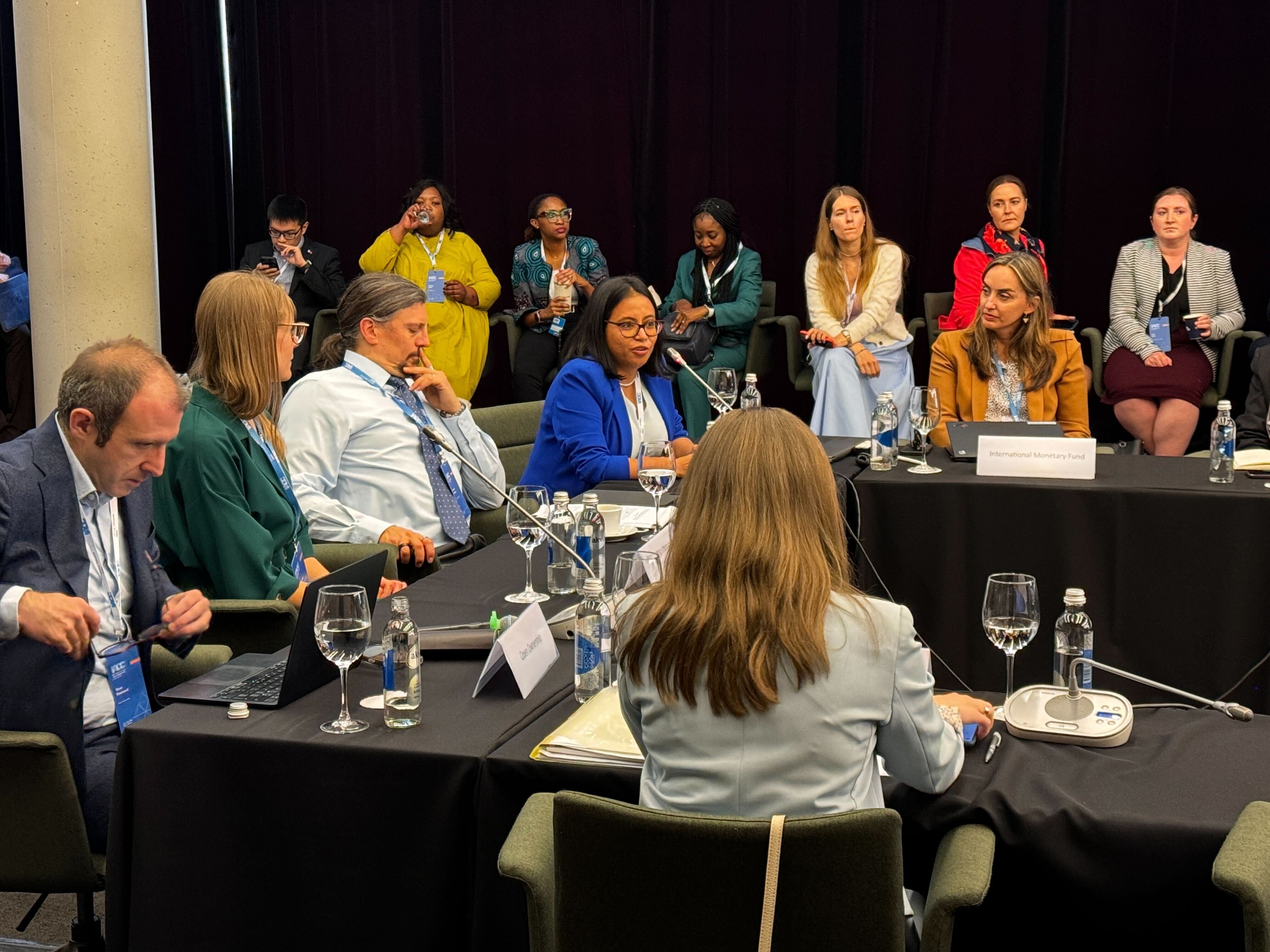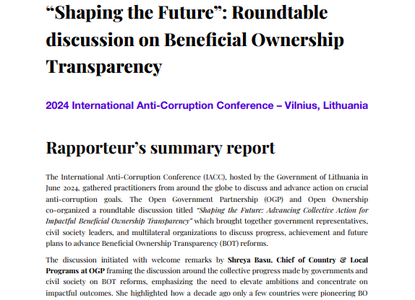Shaping the future: Advancing collective action for impactful beneficial ownership transparency

The International Anti-Corruption Conference (IACC), hosted by the Government of Lithuania in June 2024, gathered practitioners from around the globe to discuss and advance action on anti-corruption goals. The Open Government Partnership (OGP) and Open Ownership (OO) co-organized a roundtable discussion titled "Shaping the Future: Advancing Collective Action for Impactful Beneficial Ownership Transparency," which brought together senior government representatives from Armenia, Guatemala, Indonesia, Latvia, Moldova, Nigeria, Norway, the UK, and the US, along with domestic and international civil society leaders and multilateral organizations to discuss progress, achievement, and future plans to advance beneficial ownership transparency (BOT) reforms.
The full rapporteur summary for the session can be found here. As the roundtable took in various countries’ perspectives, here are some highlights of current areas of focus and future plans:
Current focus: Verification, compliance, access and interoperability of beneficial ownership data
While countries may begin their BOT journeys with varying objectives, whether for anti-money laundering, extractive industries transparency, or meeting certain requirements (such as for European Union accession), an essential part of all such reform is the legal basis.
Once legal frameworks have been adopted and beneficial ownership (BO) registers are established, register maintenance, verification and accountability mechanisms are critical means to enforce compliance and ensure BO data is accurate, up-to-date, and integrated across government. For example, to enhance compliance, Indonesia requires companies to declare their beneficial owners to be able to proceed with crucial official processes.
Availability and access to BO information is vital to demanding accountability. Transparency International looks to the new European Union Anti Money Laundering Directive 6 (AMLD 6) to set a norm where civil society and journalists are guaranteed access to BO data.
There is also a trend towards expanding the scope and use of BO disclosure in different areas and increasing data integration across government, for instance by linking it to public procurement data. Several countries have also focused on the need for standardization and interoperability to enable BO data use across borders, such as for asset recovery and sanctions enforcement, including Ghana, Latvia, Moldova, and Ukraine.
The next frontier: Increase data use and demonstrate impact
As TI-Lithuania highlighted, a BO register is not an end in itself. There is a call from civil society to push the conversation beyond data availability towards data use, as a means to expose corruption and aid law enforcement. The Transparency International-Secretariat is working on a new project in nine EU Member States toward this end, conducting research to better understand how Financial Intelligence Units are using data and identifying data users’ challenges. Similarly, the World Bank, in partnership with Open Ownership and with the support of UK Foreign and Commonwealth Development Office, is also launching a new research program to better understand the use and impact of BO registers.
Beyond different uses of BO data and the consensus that verification mechanisms must be established to ensure the data can be used, participants shared some key lessons learned.
- There is a need for BOT champions to navigate the political landscape to maintain commitment through election cycles.
- As countries introduce or strengthen legal bases for BOT enforcement, it is equally important to build institutional capacity to ensure new rules can be implemented and enforced.
- Challenges to BOT progress include the need to strengthen people’s digital access to increase potential data users and to address the issue of local enablers for foreign interests, as well as the need to make compliance and enforcement easier such as through process digitization.
OGP and Open Ownership look forward to continuing to support countries in their journeys and to convene spaces for leadership and peer exchange on this topic, including alongside key implementation partners such as the World Bank. Countries like Ukraine and Brazil are leveraging the Open Gov Challenge to raise ambition and spotlight the reforms on anti-corruption that reformers in those countries are working on. We encourage all to follow suit to advance beneficial ownership transparency and strengthen our democracies worldwide.
The full rapporteur summary for the session can be found here.
Related articles and publications
Publication type
Blog post
Country focus
United States of America,
Indonesia,
Nigeria,
Armenia,
Lithuania,
United Kingdom of Great Britain and Northern Ireland,
Norway,
Republic of Moldova,
Latvia,
Guatemala
